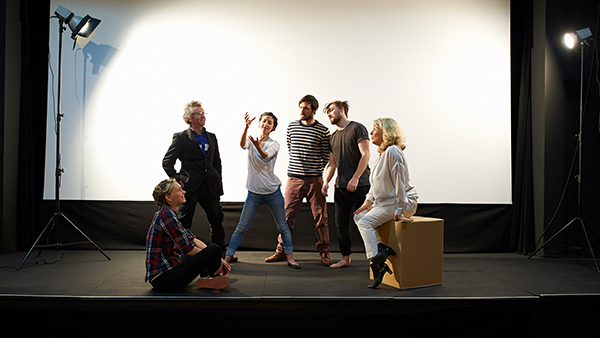Lots of things I want to write in my blog but another 65 hour week has frustrated me. So just a quick note on the speech I gave to the Training and Development Agency for Schools yesterday.
I am trying to link some of my ideas about pro-social behaviour and how we create the citizens of the future with questions about the future of teaching.
As always my aim is to make up for a lack of expertise with a willingness to be provocative (given the number of RSA Fellows with educational expertise this is probably a big mistake).
In essence the argument is:
1. The future task of schooling must be about building children's capabilities (as we do with the RSA Opening Minds curriculum).
This means developing children who, as well as the basics, have attributes like self-confidence, the ability to solve problems and show initiative, team working and communication.
Above all the aim of schooling is that every child leaves school with the desire and the ability to continue learning throughout life.
2. For this to happen, personalised learning as we understand it now is only stage one.
The advent of good pupil data enabling teachers, parents and pupils to agree individual learning plans and objectives is a major step forward. But we need a much bigger cultural change if schools are genuinely to be able to meet the specific needs and capacities of every child as a whole child.
Given the demands made by today's schools and today's kids, it is a massive ask for teachers to see and treat every child as an individual with their own strengths, weaknesses and potential, and to ask them to focus not just on controlling and pouring knowledge into children but to develop them as rounded citizens.
Of course, some will say such demands can only reasonably be made if we lift burdens in others areas (the recent debate about the effects of external testing come to mind).
3. Real personalised learning will make new and stretching demands on individual teachers and on heads in managing staff.
The way teachers work now and the way we think about teaching as a career is not generally adequate to the task.
We need a new model of 'sustainable teaching' to enable the transformative change needed in schooling.
4. Key aspects of sustainable teaching should be the 'connected teacher'.
This means teachers must have experience of the world before entering the profession (we should ban anyone from going straight from school, to college, to school) and must refresh themselves throughout their careers with activities outside teaching and breaks from the classroom.
5. It also means the 'supported teacher'.
Psychotherapists, counsellors and coaches all recognise that they too need counselling if they are to do their jobs properly and not burn out.
As well as in service training every teacher needs one-to-one and small group support so they can download the demands, the excitements, the pressures and anxieties of their role, and be encouraged and challenged by their peers - to be nurtured and cared for both as individuals and professionals.
Too many teachers get burnt out and spend the latter days of their careers waiting for their pension (and too often demoralising those around them).
Those who leave teaching after a few years are often those who set out as the most ambitious and committed; they simply can't handle it when their idealism comes face to face with school reality.
If we are going to demand more of teachers we must recognise the psychological wear and tear of their jobs.
6. And it means recognising the importance of teachers as a team.
In unsuccessful schools the staff room often acts as the focus for negativity, with those who have lost enthusiasm being the loudest voices.
Many heads understand this and build strong teams at every level. But despite how crucial it is to success, people management in large schools is not, generally, as systematic, professional or ambitious as in other similar sized organisations.
7. The TDA has done a good job of raising the status of teachers and addressing what appeared, a few years ago, to be a looming recruitment crisis.
We should see this achievement as simply the solid starting point from which we can enable teachers to be the drivers of school transformation.
Related articles
-
Vision and distinctiveness: An RSA Academies retrospective
Colin Hopkins
After 10 years, RSA Academies officially closed its activities on 31 March 2022. In that time the project has engaged some 15,000 children and young people. Read this retrospective analysis of the project from Colin Hopkins.
-
Four priorities for the cultural education workforce
Mark Londesborough
A recent workshop with RSA Fellows provided invaluable insight into the key concerns and opportunities facing cultural education workers and employers.
-




Join the discussion
Comments
Please login to post a comment or reply
Don't have an account? Click here to register.
'We need a new model of 'sustainable teaching' to enable the transformative change needed in schooling'
As you know the social tools that are now emerging into our lives gives us the opportunity to think beyond the burden of schooling and to explore a world of 'sustainable learning' in a knowledge sharing community.
Good. But what if children’s skills (cognitive and non-cognitive) are partly formed very early - pre-school, or even in the womb, as some work by James Heckman seems to suggest?:
http://jenni.uchicago.edu/huma...
Could it be that schooling happens too late, which limits its ability to substantially affect some children - those most in need?
I’m just asking…
Is It well-rounded and happy engaged citizens you wish to help to mould or productive workers? Your new academy in Princes End has been turning out effective Factory fodder for years. Are you about to become a Call centre fodder producer? The total disregard for the feeder primaries and the arrogance of we know best will not help in achieving the mind shift you desire and need .I wish this experiment every success( My son becomes a pupil in September) but do feel that you need to follow your own advice and spent some time learning before you teach .